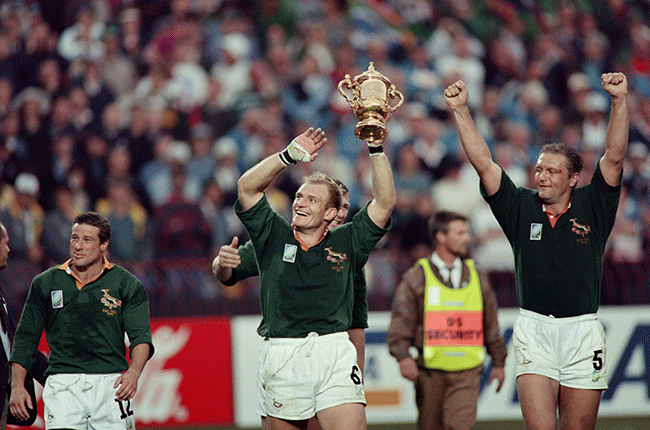


Francois Pienaar and Hannes Strydom celebrate 1995 Rugby World Cup victory
- While they still had a good tally of RWC ’95 heroes available, South Africa slipped a notch or two in the follow-up year.
- The Boks of 1996 disappointingly surrendered five of seven Tests against arch-rivals New Zealand and Australia.
- Coach Kitch Christie and captain Francois Pienaar slipping off the radar in 1996 contributed to the team’s fading fortunes.
They were the rightful toast of the nation for weeks on end … but the one thing the first-time World Cup-winning Springboks of 1995 failed to do was retain a sense of global mastery for long.
READ | THAT DROP: Joel Stransky admits All Blacks forced him to think outside the box
The following year, South Africa would surrender their proud, long-standing record of never having lost a home Test series to their greatest rivals New Zealand, a landmark that had stood since 1928.
On the plus side, the fall didn’t come immediately.
Helped by the fact that revered head coach Kitch Christie was still at his post, despite increasingly failing health, the Boks won three further Test matches in 1995 to ensure a sparkling clean slate for the momentous calendar year: played 10, won 10.
By and large, they kept together the nucleus of the Webb Ellis Cup heroes for that trio of “afterglow” assignments … remember that almost exactly half of their RWC-winning squad had been aged 25 or below at the outset of it.
The first was an easy 40-11 disposal of Wales in Johannesburg, which nevertheless marked the Bok debut of a later-to-be-auspicious international captain Gary Teichmann, the Sharks No 8, as Mark Andrews – daringly used as eighth-man toward the back end of the World Cup – reverted to his more familiar lock berth.
It was memorable, if that is the appropriate word, also for the early haymaker big Kobus Wiese landed on Welsh second-row beanpole Derwyn Jones, although remarkably missed by the officials (the Transvaal behemoth would earn a 30-day ban afterwards).
The Boks then went on a short end-of-year tour, beating Italy (41-20) and England (24-14) to head back for the local summer in upbeat mood for the challenges of the 1996 season.
But a bigger disturbance to their equilibrium than they would have liked was to come in the early autumn of ’96, as it was learnt Christie would not be able to persevere as Bok coach as his leukaemia battle worsened (he would later die in 1998).
Unbeaten in his 14 Tests at the helm, it was always going to be a tough act to follow him … and that responsibility was handed to Andre Markgraaff.
Initially, the uncompromising former Western Province lock and Griquas coach kept faith in RWC frontline figure Francois Pienaar both as a flanker and captain, but it was not a “love affair” that would last long.
South Africa won only two of their first five Tests under the eventually only year-long tenure of Markgraaff – he would be fired after recordings of racist remarks came to light – and he made Pienaar a high-profile casualty of that bumpy phase.
The blond loose forward was given the chop, never to return after a career embracing 29 Tests, following the 29-18 Tri-Nations home reverse to the All Blacks, a game where the Boks had held the aces 15-6 at the break.
It was the start of Teichmann’s era as skipper, one that began in similarly turbulent fashion results-wise but would be highlighted later by the Boks’ first elevation to the Tri-Nations crown in 1998.
The popular Natal Sharks leader was unable to prevent that epoch-making first home series loss to New Zealand, as the two Tri-Nations meetings that year (both won by the All Blacks) then saw the two superpowers shift swiftly into a more dedicated series between them.
As reminded painfully to South Africans in a New Zealand-angled documentary screened on SuperSport during lockdown recently, Sean Fitzpatrick’s side were beyond elated as they clinched the brutal, decisive Loftus Test 33-26 to end the traditional bogey on our soil.
By then, Markgraaff had also, rightly or wrongly, significantly begun to dismantle the heroic class of RWC 1995, as reflected in his starting line-up in Pretoria which included newer faces like Justin Swart on the right wing, Andre Snyman and Danie van Schalkwyk as his midfield combination, Henry Tromp at hooker and Andre Venter on the blindside flank.
The Boks’ end-of-year tour, to Markgraaff’s credit, saw them show seeds of some regrowth with a 5/5 haul, including in a brace of Tests each against Argentina and France.
ALSO READ | Our 1995 heroes: So who was the classiest of all?
But the fact remained that they had also lost five of seven meetings in 1996 against southern hemisphere fierce adversaries the All Blacks and Wallabies – stats that will always have Bok fans spitting their biltong in dissatisfaction.
From Christie’s dreamy 100 percent win record in 1995, the Boks of ’96 slipped to eight wins from 13 starts in total: win percentage a much more ordinary, by SA standards, 61.53%.
Did the Springboks forge a formidable dynasty after RWC 1995?
The answer, sadly, is a reasonably clear-cut “no”.
*Follow our chief writer on Twitter: @RobHouwing

